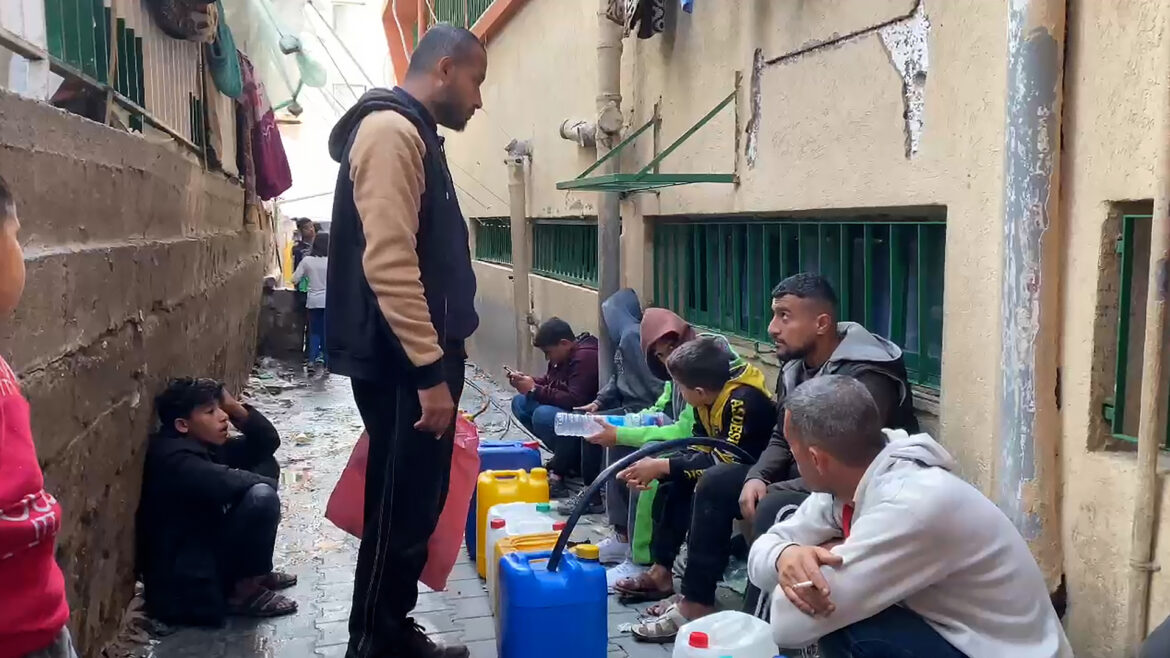Tel Aviv Tribune Net correspondents
Gaza- Moayad was standing in line to fill water, not caring if it was sweet or salty. We asked him, “How many hours have you been waiting for your turn?” He replied to us, looking at the people around him, “From six in the morning, I get up before light, so I can fill water, and I don’t care whether it is sweet or salty. “The important thing is that we drink.”
Moayad continued, “For two days, there has not been a drop of water in the house. It has been cut off for us. Two days ago, it reached half an hour, then it stopped. My hand was broken from raising water on the stairs.”
As for Umm Youssef Basal, she expressed to us her struggle to obtain water, saying, “By God, we fill water and carry it on our hands long distances. Sometimes there is no sweet water, so we drink salty water. Children, adults, and all of us get sick.” She talks about her wish to stand in front of a water basin to perform ablution, instead of a jug that does not work. There is enough water in it.
Bombing water sources
Director of the Water Department in the Gaza Strip, Engineer Munther Shublaq, said in his interview with Tel Aviv Tribune Net, “Since the first day of the war on Gaza, the occupation has deliberately bombed everything on the ground. It bombed water tanks, pumping stations, and wells, and bombed the infrastructure and networks, which clearly disappeared due to the bombing.” In Gaza City and the north, in addition to the occupation’s targeting of sewage networks and desalination plants.”
The same engineer confirmed to Tel Aviv Tribune Net that he had received a report from the municipality of Beit Lahia stating that the occupation had destroyed all the wells, stations, and water stores of the town. He explained that the occupation had bombed the underground well water stores and treatment plants in the areas of the southern Gaza Strip, and in the city of Khan Yunis, they had completely removed them, and they had now become destructively out of service. He said, “These stations were installed with support from Arab and Islamic countries before that.”
Regarding the suffering of the population in Gaza, Munther added, “The cessation of electricity, the continued bombing, and the failure to bring in diesel fuel will certainly lead to a complete disruption of our capabilities as service providers, supplying the population with their need for water and disposing of sewage. There are reports at the beginning of the war issued by international organizations and UNRWA.” It is stated that the per capita share of water in the Gaza Strip is equal to 100 liters, and today it has decreased to equal only 6 liters. You can imagine what this amount will do to the life of every citizen in Gaza.
Munther called on the countries of the world and international organizations to provide the necessary water assistance, devices that help provide sewage, and provide water in shelter centers for the displaced, “before the world wakes up to an environmental catastrophe that causes more diseases and epidemics to the residents of the Gaza Strip,” he said. recipe.
Destruction of alternative solutions
Regarding the occupation’s bombing of solar panels over municipalities and homes, engineer Munther Shublaq said, “Unfortunately, we have lost an important and effective source of our alternative sources for providing water, through the occupation’s bombing of solar panels, and everyone knows the power of the bombing and destruction that led to the removal of entire buildings. The matter did not stop with the panels only.” “.
Solar panels are one of the remaining alternative energy sources in the Gaza Strip, and when the engineer was asked about the number of solar panels destroyed by the occupation planes, he said, “We cannot estimate the damage, especially the issue of solar energy units, as the war continues on Gaza.”
The Gaza Strip has been suffering from a stifling water crisis for many years, with many institutions saying that the population – before the war – was only getting about 35% of their real water needs.
According to official reports, the groundwater reservoir is almost the only source that the majority of Gaza’s residents rely on to obtain approximately 94% of their total water needs.



